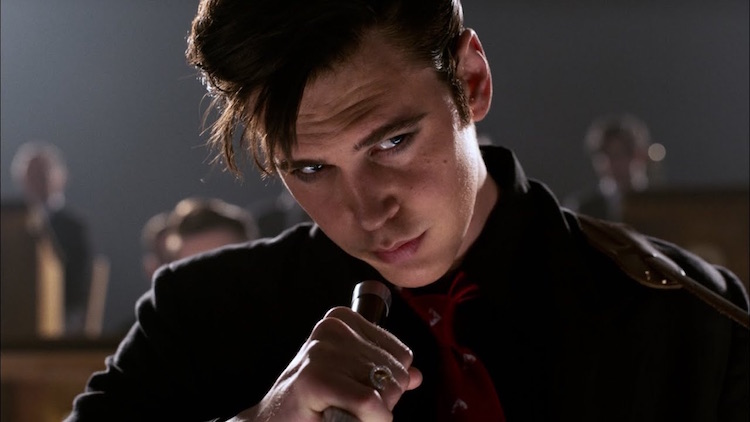In the pantheon of great biographical film epics, the new offering from director Baz Luhrmann chronicling the life and rise to superstardom of a young man from Tupelo, Mississippi named Elvis Aaron Presley (as played by Austin Butler), simply titled Elvis, may rank up amongst the greatest ever made for now, and possibly for some time to come.

What is refreshing about Luhrmann’s film is that in portraying the complicated relationship that Presley had with his manager, Colonel Tom Parker (Tom Hanks) as told through the eyes of said manager, the film refrains from becoming a sad tale of the decline of a once great artist, but is instead a tragedy of Shakespearean proportions that properly treats Elvis as the tragic, yet enigmatic hero that he was. When actual footage of Elvis is used to close the film, it serves less as a shocking moment of the man’s deteriorating health, but more as a lasting testament to the charisma and talent that made him the King.
Overall, the film explores Presley’s life during the twenty or so odd years that he was managed by Parker. This covers his rise to fame as well as the seminal events of his life spanning that time. But what is unique about Luhrmann’s approach is that the story is not necessarily told in a completely linear fashion and that allows it to achieve more gravitas than it might have otherwise. This is not a simple biopic of a popular entertainer; this is the epic tale of a larger-than-life figure that not only tells one individual’s story, but also the evolving American culture and the so-called “loss of innocence” that Elvis and the invention of rock ‘n’ roll facilitated.
Though there are a myriad of noteworthy performances within the frames of Elvis – such as Kelvin Harrison Jr. as B.B. King and Olivia DeJonge as Priscilla Presley – the focus of the majority of the film rests with both Elvis and Colonel Parker and, as such, it becomes a showcase for both Butler and Hanks. Butler inhabits the character of Presley and puts to shame anyone who may have doubted his portrayal would do the story justice. Similarly, Hanks is all in as the “villain” of the story as he manipulates Elvis and the world around him to get out of him what he wants without regard for the young man’s desires, let alone his well-being.

Austin Butler in “Elvis.” (Courtesy of Warner Bros. Pictures)
Working from a script written by himself, along with long-time collaborator Craig Pearce, as well as Sam Bromell and Jeremy Doner, Luhrmann treats the film as an epic-poem type of story and that resonates throughout every aspect of its production. Mandy Walker’s cinematography lends the film a surreal yet evocative lush atmosphere that allows it to achieve the soaring levels it does alongside the production design provided by Catherine Martin and Karen Murphy. The editing work done by Matt Villa and Jonathan Redmond is the glue that holds the bulk of the film together as it seamlessly pivots between time periods and locations to effortlessly portray the man transforming into the legend he would eventually become.
Although some may look to Luhrmann’s treatment of Elvis as more myth creation than substantial biopic, it is a film that manages to transcend genres and create an equally impressive tapestry of a well-documented life and legend.

| Producer: | Gail Berman, Baz Luhrmann, Catherine Martin, Patrick McCormick, Schuyler Weiss, Andrew Mittman |
| Release Date: | June 24, 2022 |
| Running Time: | 159 minutes |
| Starring: | Austin Butler, Tom Hanks, Helen Thomson, Richard Roxburgh, Olivia DeJonge, Luke Bracey, Natasha Bassett, David Wenham, Kelvin Harrison Jr., Xavier Samuel, Kodi Smit-McPhee, Dacre Montgomery, Leon Ford, Kate Mulvany, Gareth Davies, Charles Grounds, Josh McConville, Adam Dunn, Yola, Alton Mason |
| Writer: | Baz Luhrmann, Sam Bromell, Craig Pearce, Jeremy Doner |
| MPAA Rating: | PG-13 (for substance abuse, strong language, suggestive material and smoking) |
| Director: | Baz Luhrmann |
| Distributor: | Warner Bros. Pictures |
| External Info: | Official Site / Facebook / Instagram / Twitter |
